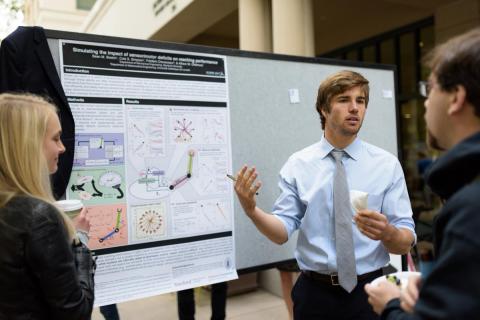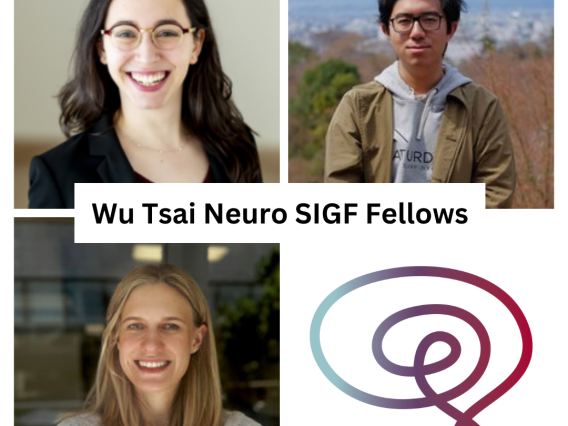Training the next generation of interdisciplinary neuroscientists
The Stanford Interdisciplinary Graduate Fellowship (SIGF) is a competitive, university-wide program that awards three-year fellowships to outstanding doctoral students engaged in interdisciplinary research. Three independent institutes, Bio-X, Wu Tsai Neurosciences Institute, and Sarafan ChEM-H award these graduate fellowships in the biosciences.
The Wu Tsai Neurosciences Institute partners with the Vice Provost for Graduate Education and Stanford BioX to award Stanford Interdisciplinary Graduate Fellowships (SIGFs) in the area of neuroscience. We are grateful to Bio-X and the Bio-X Leadership Council for incorporating the fellowships affiliated with the Institute into their application process.
2024 SIGF Application
All applications submitted through the portal will be considered for fellowships associated with Stanford Bio-X, Wu Tsai Neurosciences Institute, and Sarafan ChEM-H. Students with research especially aligned with the scientific mission of the Wu Tsai Neurosciences Institute graduate fellowships should select "Wu Tsai Neurosciences Institute Fellowship" on their application.
Funded SIGF projects
Determining higher-order organization of control and epileptic brain networks at single cell resolution
Dr. Darian Hadjiabadi aims to identify higher-order features of neuronal circuits responsible for seizure initiation and propagation by quantifying mesoscale-network reorganization in genetic models of zebra sh that faithfully recapitulate seizure dynamics in humans.
How do Schwann cells sort and myelinate axons in the developing peripheral nervous system?
Schwann cells (SCs) sort and myelinate peripheral axons, and impairments in either process can cause long-term disability. There are no therapeutic strategies for targeting SC dysfunction, underscoring the need to investigate mechanisms of sorting and myelination. Both processes require highly motile SC cytoplasmic protrusions, but the basis of this motility is unclear.
Geometric analysis and variability mapping in human white matter brain structures
Understanding the relationship between structure and function in the human brain is a key interest in neuroscience. In recent years the focus is turning to understanding the role of the white matter in human cognition, brain function and neurological disorders.
Design and development of a high-performance intra-cortical speech BCI
Many neurological injuries and diseases such as brainstem stroke and Amyotrophic Lateral Sclerosis (ALS) result in severe speech impairment, drastically reducing quality of life. Recent progress in brain-computer interfaces (BCI) has allowed these individuals to communicate, but performance is still far lower than typical spoken conversation speeds.
Deep brain microstimulation for memory recovery
Yi Lui's project aims to use deep brain microstimulation (DBMS), which causes even less brain damage and has higher spatial resolution than DBS, for memory recovery.
A multi-rank statistical model to determine the impact of behavioral state on navigational coding by medial entorhinal cortex
Behavioral state—such as alertness or exhaustion—dramatically impacts how our brains function. Yet, in spite of the key role that it plays in cognition, how behavioral state influences brain function remains a central mystery in neuroscience.
Understanding why neurons die in disease
Many neurological diseases feature the death of neurons, but the mechanisms that mediate cell death in these disorders are unknown. Astrogliosis, the response of a cell-type called “astrocytes” to injury, is common to most diseases of the central nervous system (CNS), and recent studies in our lab suggest that some reactive astrocytes may release a protein that is potently toxic to neurons.
Inference via Abstraction: A framework for efficient Bayesian cognition
We propose a novel framework for efficient Bayesian cognition called Inference via Abstraction (IvA), which learns to approximate complex world models with simpler abstractions that capture main dependencies, but leverage structure in the prior distribution for efficient inference. We instantiate IvA with a combination of probabilistic graphical models and deep neural networks.




